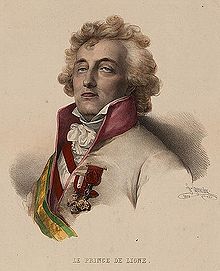Charles-Joseph, 7th Prince of Ligne
| Charles-Joseph | |||||
|---|---|---|---|---|---|
 |
|||||
| Prince de Ligne | |||||
| Reign | 7 April 1766 – 13 December 1814 | ||||
| Predecessor | Claude Lamoral | ||||
| Successor | Eugène | ||||
| Born |
23 May 1735 Brussels |
||||
| Died | 13 December 1814 (aged 79) Vienna |
||||
| Spouse | Princess Franziska of Liechtenstein | ||||
| Issue | Marie-Christine, Princess von Clary und Aldringen Prince Charles-Joseph Antoine Prince François Léopold Prince Louis-Eugène Prince Adalbert Xavier Euphémie Christine, Countess Pálffy ab Erdöd Flore, Baroness Spiegel |
||||
|
|||||
| House | House of Ligne | ||||
| Father | Claude Lamoral, 6th Prince de Ligne | ||||
| Mother | Princess Elisabeth Alexandrine zu Salm | ||||
| Religion | Roman Catholicism | ||||
| Full name | |
|---|---|
| Charles-Joseph Lamoral Francois Alexis de Ligne |
Charles-Joseph Lamoral, 7th Prince de Ligne in French; in German Karl-Joseph Lamoral 7. Fürst von Ligne (also known as Karl Fürst von Ligne or Fürst de Ligne ): (23 May 1735 – 13 December 1814) was a Field marshal and writer, and member of the princely family of Ligne.
He was born in Brussels, Austrian Netherlands, the son of Field Marshal Claude Lamoral, 6th Prince of Ligne and Princess Elisabeth Alexandrina zu Salm, daughter of Ludwig Otto, 55th Prince zu Salm and his wife Princess Albertine of Nassau-Hadamar.
As an Austrian subject he entered the imperial army at an early age. He distinguished himself by his valor in the Seven Years' War, notably at Breslau, Leuthen, Hochkirch and Maxen. A young captain at Leuthen, he found himself suddenly in command of 200 men, the battalion colonels and majors having been killed, and led them to shelter from Prussian cannon fire beside a windmill; subsequently, he participated in the retreat to Königsburg.
After the war, he rose rapidly to the rank of lieutenant field marshal. He became the intimate friend and counselor of the emperor Joseph II, and, inheriting his father's vast estates, lived in the greatest splendor and luxury till the War of the Bavarian Succession brought him again into active service.
This war was short and uneventful, and the prince then traveled in England, Germany, Italy, Switzerland and France, devoting himself impartially to the courts, the camps, the salons and the learned assemblies of philosophers and scientists in each country. He developed a great admiration for Frederick the Great, even to the point of justifying his seizure of Silesia.
...
Wikipedia
